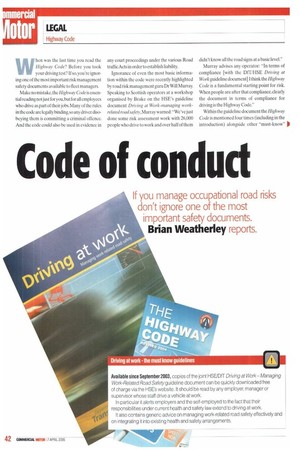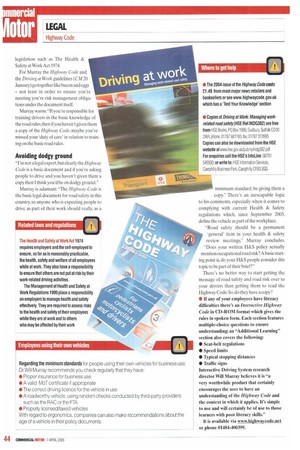Code of condud
Page 42

Page 44

If you've noticed an error in this article please click here to report it so we can fix it.
If you manage occupational road risks don't ignore one of the most important safety documents. Brian Weatheilley reports.
When was the last time you read the Highway Code? Before you took your driving test? If so, you're ignoring one of the most important risk management safety documents available to fleet managers.
Make no mistake, the Highway Code is essential reading not just for you, but for all employees who drive as part of their jobs. Many of the rules in the code are legally binding, so any driver disobeying them is committing a criminal offence. And the code could also be used in evidence in any court proceedings under the various Road traffic Acts in order to establish liability.
Ignorance of even the most basic information within the code were recently highlighted by road risk management guru Dr Will Murray. Speaking to Scottish operators at a workshop organised by Brake on the HSE's guideline document Driving at Work-managing workrelated road safety, Murray warned: -We've just done some risk assessment work with 26,000 people who drive to work and over half of them didn't know all the road signs at a basic level."
Murray advises any operator: "In terms of compliance [with the DfT/HSE Driving at Work guideline document] I think the Highway Code is a fundamental starting point for risk. When people are after that compliance, clearly the document in terms of compliance for driving is the Highway Code."
Within the guideline document the Highway Code is mentioned four times (including in the introduction) alongside other "must-know" III legislation such as The Health & Safety at Work Act 1974.
For Murray the Highway Code and the Driving at Work guidelines (CM 20 January) go together like bacon and eggs — not least in order to ensure you're meeting you're risk management obligations under the document itself.
Murray warns: "If you're responsible for training drivers in the basic knowledge of the road rules,then if you haven't given them a copy of the Highway Code, maybe you've missed your 'duty of care' in relation to training on the basic road rules.
Avoiding dodgy ground
"I'm not a legal expert, but clearly the Highway Code is a basic document and if you're asking people to drive and you haven't given them a copy then I think you'd be on dodgy ground."
Murray is adamant: "The Highway Code is the basic legal document for road safety in this country, so anyone who is expecting people to drive as part of their work should really, as a minimum standard. be giving them a copy." There's an inescapable logic to his comments, especially when it comes to complying with current Health & Safety regulations which, since September 2003, define the vehicle as part of the workplace. "Road safety should be a permanent 'general' item in your health & safety review meetings," Murray concludes. "Does your written H&S policy actually mention occupationalroad risk? A basic starting point is, do your H&S people consider this topic to be part of their brief?"
There's no better way to start getting the message of road safety and road risk over to your drivers than getting them to read the Highway Code. So, do they have a copy?
• If any of your employees have literacy difficulties there's an Interactive Highway Code in CD-ROM format which gives the rules in spoken form. Each section features multiple-choice questions to ensure understanding; an "Additional Learning" section also covers the following: 9 Seat-belt regulations • Speed limits • Typical stopping distances • Traffic signs Interactive Driving System research director Will Murray believes it is "a very worthwhile product that certainly encourages the user to have an understanding of the Highway Code and the context in which it applies. It's simple to use and will certainly be of use to those learners with poor literacy skills."
It is available via www.highwaycode.net or phone 01484-400399.
















































































































































































































